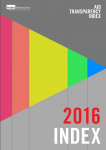 13 April 2016: Publish What You Fund released its 2016 Aid Transparency Index at an event at the Centre for Global Development in Washington, DC, US. The UN Development Programme (UNDP) is ranked first, the only organization to score above 90%, followed by the Millennium Challenge Corporation (MCC) and the UN Children’s Fund (UNICEF). The report calls on donor organizations to recognize the right to information as articulated in the Sustainable Development Goals (SDGs) and improve the quality and comprehensiveness of their data, among other recommendations.
13 April 2016: Publish What You Fund released its 2016 Aid Transparency Index at an event at the Centre for Global Development in Washington, DC, US. The UN Development Programme (UNDP) is ranked first, the only organization to score above 90%, followed by the Millennium Challenge Corporation (MCC) and the UN Children’s Fund (UNICEF). The report calls on donor organizations to recognize the right to information as articulated in the Sustainable Development Goals (SDGs) and improve the quality and comprehensiveness of their data, among other recommendations.
The report cites the International Aid Transparency Initiative (IATI) Registry, a framework for publishing data on development cooperation activities, to which more than 50% of the 397 organizations included in the 2016 Index publish data at least quarterly. However, the publication of timely, disaggregated and comparable information about development projects is “far from complete.” Further, as the world begins the first year of SDG implementation, the report finds that only ten donors, representing 25% of total aid, have met the 2011 Busan Partnership Agreement’s commitment to aid transparency.
Among the organizations ranked as “very good” performers on the Index are the UK Department for International Development (DfID), the Global Fund, the World Bank-International Development Association, the Asian Development Bank (ADB), the Government of Sweden and the African Development Bank (AfDB). China is last in the rankings, classified as “very poor,” along with the United Arab Emirates (UAE), France, Japan and Italy.
UNICEF is highlighted in the report as the “best improver” since 2013. Its “drive for greater transparency” has been fueled, the report says, by a combination of high-level internal support and improved technical infrastructure, including creation of a data warehouse and automated reporting system, a unit to improve aid transparency, and an open data portal. The report calls on UNICEF also to use its data internally and share it with partner governments.
In a keynote address at the launch event on 13 April 2016, UNDP Administrator Helen Clark cited the need for “urgent improvements” to both the quantity and the quality of available data, and called for universal adoption of the IATI Standard. She said greater transparency on development funding and operations is critical for the 2030 Agenda for Sustainable Development, as it to enables donors to: make informed decisions on available funding and allocation and hold governments accountable; support national ownership; and make real-time data available, including by tagging projects that relate to particular crises or emergencies.
In an ‘Our Perspectives’ piece, Abdul Riza, UNDP, identifies the “cultural shift” needed to incorporate IATI into the daily routine of UNDP’s country offices. He recalls that changing staff mindsets about operations and reporting “was not easy” and entailed preparing extensive guidelines, building systems to support data collection and processing, and creating an internal transparency dashboard for country offices to monitor project information. He says UNDP aims to continue its efforts towards transparency, including through collaboration with the UN Development Group (UNDG) to develop a transparency portal with data from all UN publishers and supporting access to information and transparency in the 2030 Agenda. [2016 Aid Transparency Index] [Launch Event] [UNDP Press Release] [UNDP Administrator Statement] [UNDP Blog] [IISD RS Story on IATI Annual Report 2015]